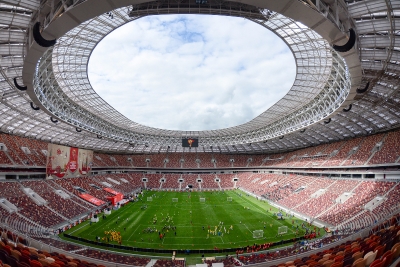
Russia’s football stadiums go green for the World Cup
Football’s governing body, FIFA, has announced that the Luzhniki Stadium in Moscow has passed the BREEAM international certificate awarded to sustainable buildings.
As the latest football World Cup inches closer, the main venue hosting the games has had to meet strict sustainability criteria. The stadium, originally built in 1955, has undergone a complete renovation ahead of the tournament to ensure it meets FIFA’s standards.
Energy conservation is now a strong feature of the ground, along with LED lighting and water-saving technology. It is estimated that hundreds of thousands of litres of water will now be saved during match days. In addition, 1,050 new trees and bushes were also planted and the surrounding landscape conserved during reconstruction.
The Local Organising Committee’s Head of Sustainability, Milana Verkhunova, commented: “The World Cup is taking place in Russia for the first time in history, and today we see how preparations become a catalyst for important changes in all walks of life…Building World Cup stadiums in accordance with green standards will ensure we have resource-efficient, safe and comfortable football arenas and it will also mean the country’s culture of environmental awareness reaches a new level in general”.
The Spartak Stadium, also in Moscow, and Kazan Arena have both also achieved certification for their sustainability efforts.
"Stadiums are key in our efforts to stage a successful and more sustainable FIFA World Cup, which is why FIFA has made green certification mandatory for all arenas used for the event,” said FIFA Head of Sustainability & Diversity Federico Addiechi. “I am very glad to see that three of the 2018 FIFA World Cup stadiums have already successfully achieved their sustainable certification following Russian as well as international green building standards."
The tournament, which takes place every four years, will be held in Russia between 14 June - 15 July across 12 venues.